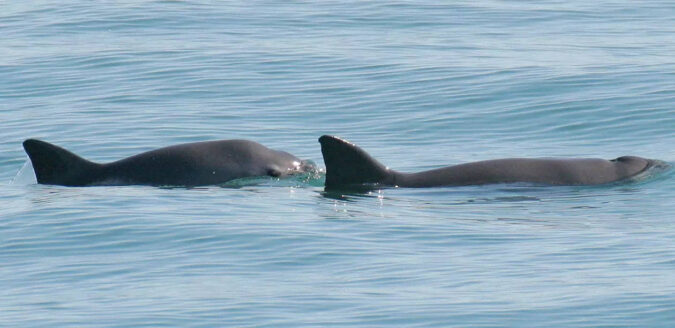Geneva: Mexico was sanctioned on Monday by an international wildlife body for not doing enough to protect the vaquita porpoise, the world’s most endangered marine mammal.
The trade sanctions issued by the Convention on International Trade in Endangered Species (CITES) prevent Mexico from exporting millions of dollars worth of regulated animal and plant products around the globe.
The population of Pacific porpoises — nicknamed “vaquita” or little cow in Mexico — has been devastated by gillnets used to catch totoaba, a large fish whose swim bladder is prized in China for its alleged medicinal properties.
The totoaba is also an endangered species, and its bladder-fins sell for thousands of dollars per kilo in China.
The vaquita, the smallest porpoise on the planet, has been listed as critically endangered by the International Union for Conservation of Nature since 1996.
According to several conservation NGOs, there are only 10 Pacific porpoises left.
The sanctions on Mexico cover more than 3,000 animals and plants running into “millions of dollars in exports”, a joint statement issued by several environmental and animal welfare NGOs said.
“These include lucrative products such as crocodile leather, mahogany, tarantulas, pet reptiles, cacti and other plants,” the statement said.
In response, the Mexican Ministry of Foreign Affairs said it was being subjected to “unequal treatment” and that its conservation efforts have not fully been taken into account.
A Mexican delegation was in Geneva on Monday to discuss efforts to protect the cetaceans, which live only in the northern Gulf of California.
Conservationists have previously been involved in a number of violent confrontations with fishermen while working with Mexican authorities to remove illegal nets.
“While no one relishes economically painful sanctions, all other efforts to push Mexico to save the vaquita haven’t been enough,” said Sarah Uhlemann, international programme director at the Center for Biological Diversity.
“The strongest measures possible are needed to wake up the Mexican government and prompt it to finally save this tiny porpoise from extinction.”
According to CITES, the sanctions will remain in effect until a revised protection plan is deemed adequate.
The trade sanctions issued by the Convention on International Trade in Endangered Species (CITES) prevent Mexico from exporting millions of dollars worth of regulated animal and plant products around the globe.
The population of Pacific porpoises — nicknamed “vaquita” or little cow in Mexico — has been devastated by gillnets used to catch totoaba, a large fish whose swim bladder is prized in China for its alleged medicinal properties.
The totoaba is also an endangered species, and its bladder-fins sell for thousands of dollars per kilo in China.
The vaquita, the smallest porpoise on the planet, has been listed as critically endangered by the International Union for Conservation of Nature since 1996.
According to several conservation NGOs, there are only 10 Pacific porpoises left.
The sanctions on Mexico cover more than 3,000 animals and plants running into “millions of dollars in exports”, a joint statement issued by several environmental and animal welfare NGOs said.
“These include lucrative products such as crocodile leather, mahogany, tarantulas, pet reptiles, cacti and other plants,” the statement said.
In response, the Mexican Ministry of Foreign Affairs said it was being subjected to “unequal treatment” and that its conservation efforts have not fully been taken into account.
A Mexican delegation was in Geneva on Monday to discuss efforts to protect the cetaceans, which live only in the northern Gulf of California.
Conservationists have previously been involved in a number of violent confrontations with fishermen while working with Mexican authorities to remove illegal nets.
“While no one relishes economically painful sanctions, all other efforts to push Mexico to save the vaquita haven’t been enough,” said Sarah Uhlemann, international programme director at the Center for Biological Diversity.
“The strongest measures possible are needed to wake up the Mexican government and prompt it to finally save this tiny porpoise from extinction.”
According to CITES, the sanctions will remain in effect until a revised protection plan is deemed adequate.
